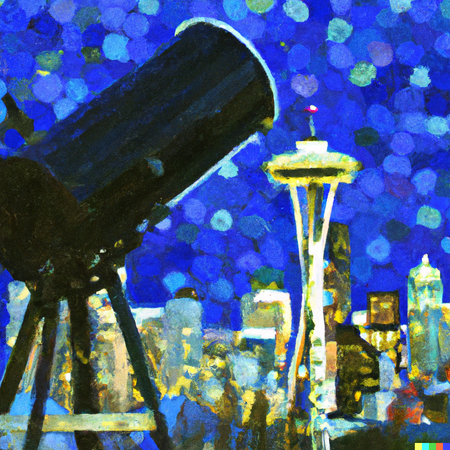Arguably one of the questions I get asked most is: doesn’t it rain too much in Seattle to have a telescope? Absolutely not! While it is true that we see a lot of rain here in the Pacific Northwest, when you break down the data, the odds of getting a clear night are a lot better than one might think. Additionally, Washington’s typically temperate climate tends to make observing nights far more pleasant than in other parts of the country.
As transplants from Colorado (a state, mind you, that is famed for “300 days of sunshine a year” - which is actually a bit of an exaggeration), Stephanie and I both asked ourselves whether astronomy would be possible in our new location. One night, in February, we decided to drive out to Cle Elum, as the weather forecast was showing clear for the night and that area had been reported as a good dark site. The weather in Seattle was miserable, but, sure enough, once we reached the other side of the mountains, it was crystal clear. We spent several hours observing that night, eventually succumbing to the cold (as can happen when observing in the middle of winter…we cleverly blamed it on a fog patch that appeared to be rolling in…that cleared the second the scope came off the mount, of course). It was that night that we realized something crucial…we spent less time in the car driving to the clear-weather site in Cle Elum than either of us had ever spent driving to dark sites in Colorado. And, the drive had a secondary perk of having excellent dark skies. That is one of the beautiful things about observing in Washington State…the locations that have the darkest skies, also tend to have some of the best observing weather.
So, while Seattle has a strong reputation for rain and cloudiness, the overarching weather patterns in Washington are quite dynamic. While it might be raining in Seattle proper, an hour or so drive over Snoqualmie Pass or to the Olympic Peninsula might yield clear, blue skies (check out this rather interesting study on the Olympic rain shadow). Of course, the summer in Washington tends to bring fantastically clear weather to the Puget Sound region, as well.
According to the Western Regional Climate Center (WRCC), Seattle has approximately 226 cloudy days per year. By comparison, Yakima has 164 and Denver, Colorado has 120. This data is telling of two things. First, Seattle has approximately 139 days that are either clear or partly cloudy. That, in and of itself, is a ton of observing in a year. Second, however, is that the Yakima area has approximately 201 clear or partly cloudy days. That’s only 45 days less per year than Denver!
As a final thought, check out this map, created by the Aqua satellite of almost 13 years of cloud cover data across the globe. What I found most interesting about this map is the amount of cloud cover the world experiences and how, on average, it doesn’t appear to be all the much cloudier in the Pacific Northwest than anywhere else (with some exceptions). While there are areas where it is clearly less cloudy, on average, than the rest of the globe, these are not the only places where people use telescopes. From the map, it is about as cloudy in Florida as it is in Washington over those 13 years!
Washington is a wonderful place to observe the night sky. The temperatures are comfortable (mostly) and, especially in Western Washington, the seeing can be excellent. Don’t let rumors about Seattle’s rain ruin your chance to enjoy the night sky. Grab your telescope and find a nice, dark place to set it up. Chances are the weather will be pretty darn good, too.
Clear Skies,
Matt


Sorry for the delayed response, @JErez! Glad you liked the article. Let us know what you think of the 114EQ when you get a chance to use it!
Hi! I’m curious about your choice of telescope!
I’m Nw of Seattle and planning on buying.
I bought a Celestron 114 EQ gift for my daughter in DE.
But no feedback yet. Like your article a lot. Thnx.
Jerez